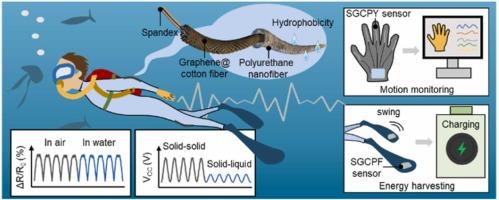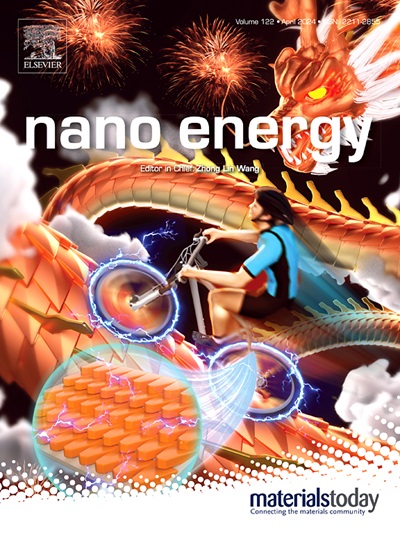基于分层芯鞘纱线的湿自适应应变传感器,用于水下运动监测和能量收集
IF 16.8
1区 材料科学
Q1 CHEMISTRY, PHYSICAL
引用次数: 0
摘要
具有运动监测和能量收集功能的双功能柔性电子器件在人类社会的日常活动中有着广阔的应用前景。然而,传统电子器件很难适应潮湿环境下的穿着舒适性和抗感应干扰特性。本文制备了一种具有优异传感和三电性能的湿适应氨纶/石墨烯@棉/聚氨酯纱(SGCPY)传感器,它由核心层氨纶纤维、中间层石墨烯@棉传感纤维和外层纺锤结聚氨酯纳米纤维组成。得益于其独特的结构,制备完成的 SGCPY 传感器具有较高的机械性能(约 80%)、超疏水性能(130°)、良好的应变灵敏度(1.82)和抗疲劳性(12000 次循环),即使在水中也不例外。在空气和水环境中,SGCPY 传感器都能稳定地监测人体运动和人机交互。当 SGCPY 传感器编织成平纹织物时,该织物还能将各种机械能转化为驱动电子设备的电能,在固-固和液-固接触时分别显示出 ~3.9 V 和 ~0.7 V 的最大电压。这项工作促进了对水下应用纺织品电子器件的深入研究,凸显了基于纺织品的多功能柔性电子器件的广阔前景。本文章由计算机程序翻译,如有差异,请以英文原文为准。

Wet-adaptive strain sensor based on hierarchical core-sheath yarns for underwater motion monitoring and energy harvesting
Bifunctional flexible electronics with motion monitoring and energy harvesting have broad application prospects in day-to-day activities of human society. Nevertheless, conventional electronics are difficult to adapt to the wear comfortability and anti-sensing interference properties in wet environments. Herein, a wet-adaptive spandex/graphene@cotton/polyurethane yarn (SGCPY) sensor is fabricated with excellent sensing and triboelectric performance, which comprises core layer of spandex fibers, middle layer of graphene@cotton sensing fibers and outer layer of spindle-knotted polyurethane nanofibers. Benefiting from its unique structure, as-prepared SGCPY sensor exhibits high mechanical properties (∼80 %), superhydrophobic performance (>130°), good strain sensitivity (1.82) and fatigue resistance (12,000 cycles) even under water condition. The usage of the SGCPY sensor is demonstrated for the stable monitoring of human body motions and human-machine interaction in both air and water environments. When SGCPY sensor weave as plain fabric, the textile also can convert various mechanical energy into electric power for driving electronic device, showing a maximum voltage of ∼3.9 V and ∼0.7 V with solid-solid and liquid-solid contact. This work fosters the in-depth study of textile-based electronics for underwater applications and highlights the promising prospects of multi-functional flexible electronics based on textiles.
求助全文
通过发布文献求助,成功后即可免费获取论文全文。
去求助
来源期刊

Nano Energy
CHEMISTRY, PHYSICAL-NANOSCIENCE & NANOTECHNOLOGY
CiteScore
30.30
自引率
7.40%
发文量
1207
审稿时长
23 days
期刊介绍:
Nano Energy is a multidisciplinary, rapid-publication forum of original peer-reviewed contributions on the science and engineering of nanomaterials and nanodevices used in all forms of energy harvesting, conversion, storage, utilization and policy. Through its mixture of articles, reviews, communications, research news, and information on key developments, Nano Energy provides a comprehensive coverage of this exciting and dynamic field which joins nanoscience and nanotechnology with energy science. The journal is relevant to all those who are interested in nanomaterials solutions to the energy problem.
Nano Energy publishes original experimental and theoretical research on all aspects of energy-related research which utilizes nanomaterials and nanotechnology. Manuscripts of four types are considered: review articles which inform readers of the latest research and advances in energy science; rapid communications which feature exciting research breakthroughs in the field; full-length articles which report comprehensive research developments; and news and opinions which comment on topical issues or express views on the developments in related fields.
 求助内容:
求助内容: 应助结果提醒方式:
应助结果提醒方式:


